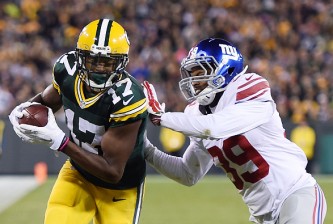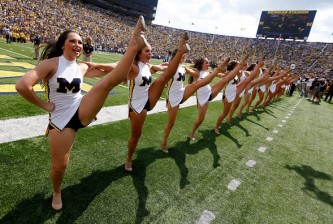In another documentary in its critically acclaimed series “Sports of the 20th Century”, HBO has hit a home run in its look at the life of Ted Williams.
It starts with author Richard Ben Cramer talking about how Williams wants the movie of his life to begin, with a scene of a fighter plane from the pilot’s eye, flying slowly over Korea on a bombing mission raining explosions on the ground. Then the screen goes dark for about ten seconds. We then see the lights of Fenway Park, hear the roar of the crowd and according to Cramer, that’s how the movie is supposed to begin. And that’s how we begin the documentary of Ted Williams.
The documentary looks at how Williams became a scientific hitter, an iconic figure who still casts a big shadow over Fenway Park and how he went to war to become a fighter pilot.
While it was easy to deify Williams, one has to know how he came to be, from his humble beginnings in San Diego. His father, a photographer and his mother, a worker with the Salvation Army, were hardly at home. Ted and his brother, Danny, were left alone to fend for themselves. You get the sense from the interviews that HBO was able to obtain for this documentary, that while he loved his mother, he also resented her for not being at home.
It was here where Ted immersed himself in baseball. Danny became a street-tough kid. Ted said the most fun he had was hitting a baseball. Williams biographer Leigh Montville says Ted devoted himself totally to baseball year round, never interested in other sports.
Former Red Sox teammate Bobby Doerr said that Ted was envious of having a father in life as Bobby did. And Cramer said Williams never liked to talk about his life growing up.
Ted had a rapid ascent to the big leagues after first signing with the minor league San Diego Padres of the Pacific Coast League. He joined the Red Sox in 1939. And he made an immediate impact hitting 31 home runs with 145 RBI. Cleveland Indians Hall of Fame pitcher Bob Feller had the line of the documentary when he noted, “Trying to sneak a fastball by Ted Williams was like trying to sneak a sunbeam past a rooster in the morning. It’s not gonna happen.”
Williams loved to acknowledge his fans during his rookie year, tipping his cap to the fans in right field whenever he went out to the field after he hit a home run. In 1940, the Red Sox retooled Fenway Park building the bullpens right center field to reduce the distance for a home run by about 20 feet and also putting him out in left field to make it easier for him defensively. It was also here where the relationship with fans changed and when the Boston newspapers started to relentlessly go after Williams.
He started to lash out at the fans when his home run totals went down in his sophomore year. When the fans booed him, he refused to tip his cap and the media began to make personal attacks. But he used adversity to fuel him on the field. If he could not control what was going on off the field, he could control what he could do in the hitter’s box.
In 1941, Williams and Joe DiMaggio dominated the sports pages. DiMaggio had his famous 56 game hitting streak. Williams hit .406. The two men played in the All-Star Game in Washington and it was Williams’ winning home run lifting the American League that gave Ted his biggest thrill in his career.
But even with Williams going 6 for 8 in a season-ending doubleheader in Philadelphia to ensure him hitting over .400 wasn’t enough to give him the Most Valuable Player award that season. He lost to DiMaggio. The interesting thing was the rivalry between the two men. DiMaggio was insanely jealous of Ted over him hitting .400 and being the hero that people wanted Joe to be. But DiMaggio had the rings while Ted had the accolades.
The documentary looks at the loyalty Ted had to his teammates Bobby Doerr, Dom DiMaggio and Johnny Pesky, plus the generosity he had towards doormen, clubhouse attendants, cab drivers and firemen.
The documentary goes over Williams’ military service joining the Naval Flight School after the 1942 season and became a flight instructor. Contrary to popular belief, he did not fly missions in World War II.
He returned to the Red Sox in 1946 and was friendlier towards the media and the fans. Fellow Naval officer George H.W. Bush said people stood up to watch Ted Williams hit. He helped to lead his team to the American League pennant where they would eventually lose the World Series to the St. Louis Cardinals in 7 games. Williams only hit .200 due to an injury he suffered during an exhibition series before the Fall Classic. He was devastated about losing, but little did he know it would be his last time in the Series.
The Red Sox had two more chances to advance to the World Series in 1948 and 1949 but fell short. During that time, the Yankees and Joe DiMaggio were winning championships leaving the Red Sox in their wake. Ted racked up individual batting titles and Most Valuable Player Awards, but never got the big prize of a World Series ring.
Ted’s family life wasn’t any better. He was away fishing when his first daughter Bobby Jo was born. And his experience with his daughter Claudia and son John Henry were at best difficult. However, all three children said they loved him and Claudia said it best when she stated, “It was hard to keep up with his emotions. But you needed to be a duck and let water roll off your back.”
Williams returned to military service in Korea with the Marines and this time, he flew missions. He had to fly jets this time and after spending an entire year in flight school retraining to fly, he went to Korea in 1953 and went into combat flying 39 missions. In one mission, he was behind enemy lines, got hit by gunfire, flew back to base on fire, landed the plane on its stomach and somehow managed not to blow up.
Ted went back to the Red Sox to find his beloved teammates gone, the oldest tenured member of the team at the age of 34. He had lost five years of his career to military service, five years he would never get back.
By the time he returned, he was more obsessed with his personal statistics. And he was more alone than he had ever been divorcing his first wife. Johnny Pesky said Ted “was never happy. He was probably was the smartest unhappiest player I ever saw.”
At the age of 41, he signed his last contract for the Red Sox, taking $10,000 less from the previous year saying what he made then, he did not deserve. In 1960, Williams gave the Boston fans a few more thrills, hitting over .300, knocking his 500th career home run, and then in one of the more dramatic last at-bats ever, hit a home run to end his career with the Red Sox. Ted says it was the closest he ever came to tipping his cap, but he did not. Then when he went to left field to be pulled out of the game, Pumpsie Green says as Williams ran back to the dugout to get a standing ovation, he said, “Isn’t this a crock?” Typical Ted.
But even with his tempestuous relationship with the writers, Williams was inducted into the Baseball Hall of Fame.
In his retirement, Williams endorsed products for Sears and became a prolific fisherman. He married Chicago socialite Lee Howard, but that marriage ended badly as well. She said he had a bad temper, would rip the telephone out of the wall and ask her to call the phone company to have it fixed. She said he did this about five times and had to handle things with kid gloves. The marriage lasted less than five years.
But he married again, this time to Vogue model and actress Dolores Wettach in 1968. The marriage gave him a son, John Henry and a daughter, Claudia. That marriage lasted just six years also ending in divorce.
He returned to baseball in 1969 as manager of the Washington Senators leading them to their best season and named American League Manager of the Year. But he tired of teaching players with lesser talent and left after the Senators became Texas Rangers.
He would make occasional appearances at Fenway Park for Old Timers Games, the official retirement of his number and became more comfortable with the fans and the media. In his later years, Williams would be revered by both alike.
Actor Robert Redford said his movie, “The Natural” was an homage to Williams and he wore the number 9 to honor him. Redford said he patterned his swing after Ted.
As he reached his 70’s, Williams suffered a series of strokes that took away most of his vision. It was at that time when his son, John Henry re-entered his life and took care of him. John Henry managed his career, ran the house, hired cooks and also had his father make appearances to sign memorabilia.
To some, it seemed Ted was working quite hard and the signing was excessive. Claudia Williams who has her father’s feistiness said, “No one asked Ted Williams to do anything he didn’t want to do. Doesn’t matter what it was. Signing a baseball, going to some function, ‘Screw you and the boat you showed up on. I ain’t doin’ it if I don’t wanna do it.'”
It seemed as if John Henry was gravy training on his father’s fame, but the main thing was that he was there for Ted. He changed Ted, he showered him, he took care of him. The Boston Globe’s Dan Shaughnessy says, “I believe (John Henry) was a loving son. I do. I think he had some weird ideas, but I do believe he loved his dad.”
In 1999, the MLB All-Star Game was at Fenway Park and Ted Williams took the center stage one more time. He rode out onto the field, tipped his cap and received a standing ovation from the crowd. The players then surrounded him and were in awe of the Greatest Hitter That Ever Lived. And Ted wanted to talk to Nomar Garciaparra, Mark McGwire and Tony Gwynn. Montville says it was Boston’s official goodbye to Williams.
After the appearance in Boston, Williams suffered more health problems to the point he had to be hospitalized. Dom DiMaggio and Johnny Pesky could hardly recognize him. Padres broadcaster Jerry Coleman who served with Williams in World War II and Korea said Williams did not know who he was. Williams passed away shortly afterward.
The unfortunate thing after his death was the battle over his last wishes and Ted being frozen in biostatis at Alcor in Arizona. His three children fought over the last will. While Bobby Jo produced a last will and testament, John Henry had an oil stained piece of paper showing that he, his father and Claudia all wished to be frozen. Claudia says the entire thing is a private family matter and never should have been fought in the media.
Two years after Ted died, John Henry died of leukemia.
But while people may remember Williams as being frozen, as time passes, people remember him for his hitting and his career.
Leigh Montville says, “I think he qualifies as an American hero because he was individualist. He was strong and opinionated. And he was John Wayne.”
Through it all, Williams was a paradox, but one thing remains. He still casts a big shadow over the Red Sox, Fenway Park, Boston and the game of baseball.
“Ted Williams” was produced by Margaret Grossi, interviews conducted and stories edited by Mary Carillo, written by Aaron Cohen and narrated by Liev Schreiber.
It’s a Tour de Force for a documentary unit that continues to churn out great stories and preserve the history of sports in the 20 century. The fact that the documentary did not shy away from the controversial stories of Ted Williams shows that HBO wanted to show all sides of the complex man.
Interviews include those with Williams biographers Leigh Montville, Richard Ben Cramer and John Underwood. Also interviewed were Boston newsapaper writers Tim Horgan, George Sullivan and Dan Shaughnessy. Former teammates Bobby Doerr, Johnny Pesky and Pumpsie Green also made appearances as well as ex-wife Lee Williams, daughter Claudia and actor/director Robert Redford among others.
Boston fans who know the history of Ted Williams will find many of the stories quite familiar, but for those who don’t, the documentary is a very interesting insight into the man. Overall grade, A. Once again, another excellent documentary by HBO.
“Ted Williams” airs Wednesday night on HBO at 9:30 with assorted replays through mid-August on HBO and HBO2.






















